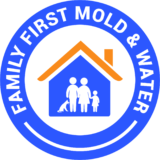Family First Mold & Water PROFESSIONALS HAVE ALL THE SOLUTIONS TO THE COMMERCIAL MOLD REMEDIATION FAQ.
Mold is a microscopic fungus that is essential to our ecosystem and a component of the natural world. While it’s essential outside, too much mold inside a building can be hazardous and unhygienic. As part of its life cycle, mold creates spores, which float through the air both inside and outside.
Many people are unaware that mold can seriously harm the structural integrity of buildings, which, if left unchecked, can result in a property losing its worth or needing expensive repairs. Additionally, exposure to mold can frequently result in symptoms like nasal congestion, eye irritation, wheezing, skin irritation, or even more serious reactions if you’ve ever had allergies.
Mold requires moisture, air that is above freezing, and a food supply, which can be anything from leaves to paper to dirt to wood to other building materials. Mold can grow more easily in places that are dusty, moist, or where the air stagnates.
A mold test can assist in determining associated microbial activity if you notice mold development or water stains. You can also search for places like roofs, pipes, ceilings, or walls where water leaks have happened. Mold may be present if there are musty odors.
The best ways to prevent mold growth are to maintain your home’s humidity level between 40 and 60 percent, use a dehumidifier or air conditioner during humid months, keep damp areas like cellars dry, and always use exhaust fans in restrooms and kitchens as well as dryer vents outside your house. Last but not least, it’s critical to have any leaks in your plumbing, walls, or roof fixed as soon as feasible.
When elevated mold levels are found, the majority of experts advise hiring a reputable remediation business. To prevent contaminating nearby spaces, remediation specialists are specifically trained to isolate and treat mold-affected areas.
Molds are occasionally referred to using words like “toxic mold” and “black mold”. The type of fungus or mold may be fascinating to identify, but the recommended course of action is unaffected. No matter what kind of mold is present, the CDC firmly advises that it be removed.
Information about Mold and Dampness,* source 18 September 2012. Centers for Disease Control and Prevention. Online at www.cdc.gov/mold/dampness facts.htm
CALL US AT 954-420-7945 ANY TIME OF DAY OR NIGHT; OUR PHONE LINES ARE ALWAYS AVAILABLE TO TAKE YOUR CALLS.
TURN UNCERTAINTY INTO CONFIDENCE
We’re available 24/7 to discuss your restoration needs. Get the help you deserve.
